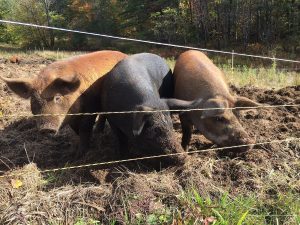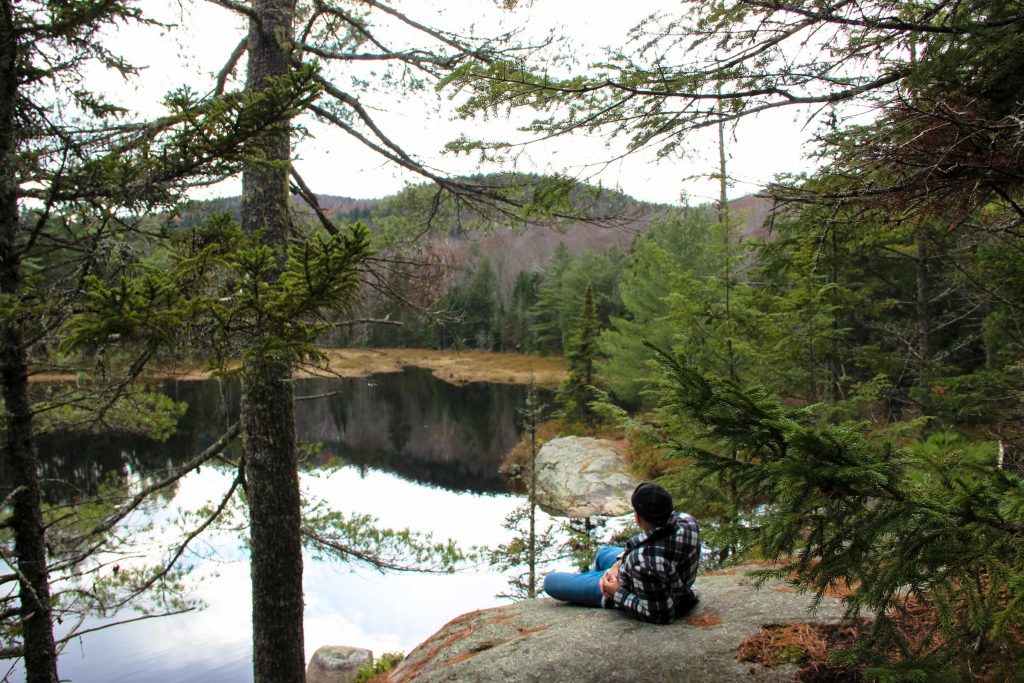Episode 68: Referendum

This week, we’re talking ballot questions. Why are more of them showing up in voting booths in states like Maine and Massachusetts, and how much power do elected officials have to tinker with citizen-passed laws? Plus, a Puerto Rican family is reunited in Holyoke, Mass., and a Vermont veteran with PTSD finds a way to heal, through farming. Listen to the end, and we’ll take you to the most peaceful place in the universe.
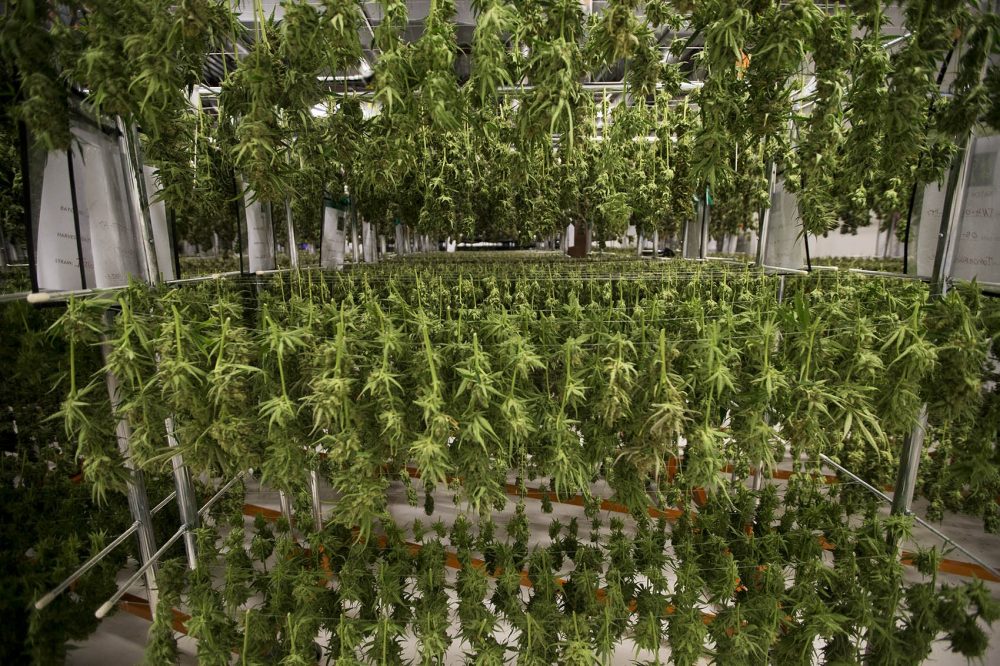
Marijuana plants are harvested and hung in a processing facility in Franklin, Mass. Currently only medical cannabis sales are legal in Massachusetts. A referendum passed in 2016 set the date for legal recreational sales to begin at January 1, 2018. But a law passed this summer by the state legislature pushed the date to July 1, 2018. Photo by Jesse Costa for WBUR
Power to the People?
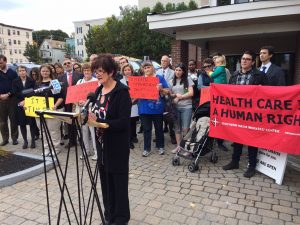
Mainer Kathleen Phelps speaks in favor of expanding Medicaid at a news conference in Portland. Me. on Oct. 13, 2016. Photo by Patti Wight for Maine Public
Maine voters earlier this month approved a ballot measure that would expand the Medicaid program, making it available to more than 70,000 Mainers. But Governor Paul LePage — who used his veto power to block past legislative attempts to expand Medicaid — has said he won’t implement Medicaid expansion until the statehouse appropriates funds to pay for the state’s share of the program.
Last year, Maine and Massachusetts voters approved legalizing recreational marijuana through a referendum — but in both states, lawmakers have altered the legislation, raising taxes and pushing back the start date for legal weed sales.
Looking forward to 2018, Boston public radio station WBUR recently polled Massachusetts residents on three questions proposed for next year’s election. Respondents showed overwhelming support for initiatives to institute paid family leave, raise taxes on millionaires, and lower the sales tax.
All this left us thinking: how powerful are ballot questions when the will of the people is later overhauled by their legislators? And why are they showing up more frequently in states like Maine and Massachusetts in recent years? Joining us to help answer those questions are Steve Mistler, chief political corespondent for Maine Public Radio, and Colin A. Young, Massachusetts statehouse reporter for the Statehouse News Service.
Trying to Find Stability
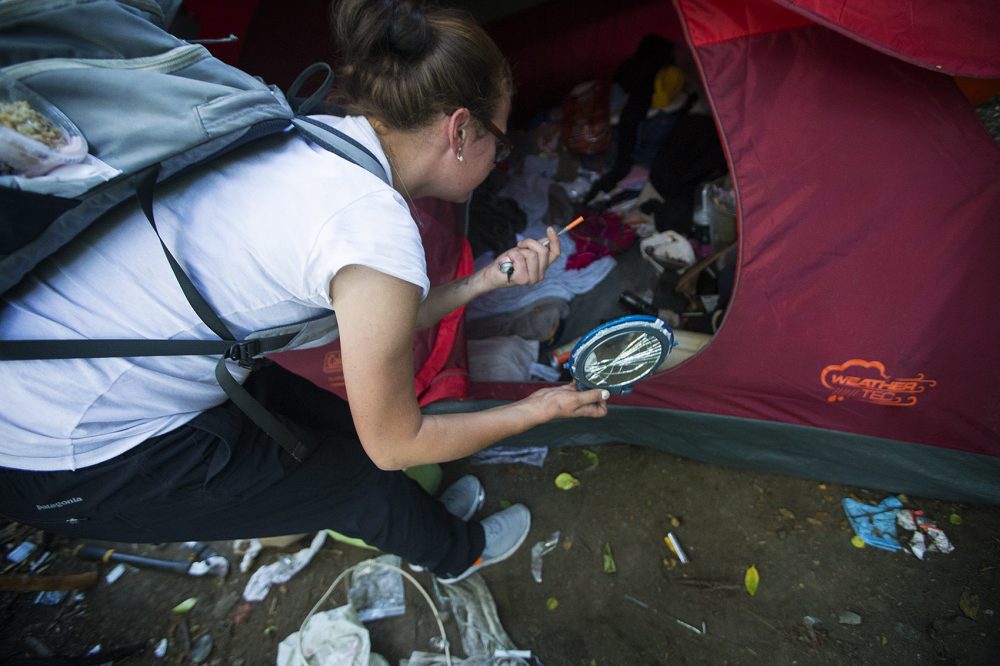
Kristin, an active drug user, finds a syringe and a mirror from the tent she once lived in that other drug users took over. She says methamphetamine users use the mirror as an aid to inject themselves in their neck. Photo by Jesse Costa for WBUR
According to Massachusetts Department of Health data, homeless individuals who use heroin or fentanyl experience an overdose-related death rate 30 times higher than people with stable housing. The finding is no surprise to drug users who live on the streets or in the woods, as WBUR’s Martha Bebinger discovered on a visit to an urban tent community in Greater Boston.
WBUR reporter Simón Rios has been charting the influx of Puerto Ricans into Massachusetts since Hurricane Maria left much of the island without power, water, or infrastructure. He went to Holyoke, and introduces us to two young parents who are trying to get their feet on the ground.
Next we travel a bit further west on the Mass. Pike to the bucolic Berkshires. Those hills are alive with art — museums, galleries, theater and dance companies, and the summer home of the Boston Pops, Tanglewood.

“La Fete,” by Raoul Dufy, is one of the works slated for sale by the Berkshire Museum. Image courtesy of Sotheby’s
But the arts community has been in turmoil over a plan by the Berkshire Museum to sell off some of its artwork — including two Norman Rockwell paintings — to fund an expansion. The plan angered many in the art world, and got the attention of the state’s Attorney General, who’s working to stop the sale. Our guest Adam Frenier, Berkshire County reporter for New England Public Radio, has been following the story closely.
Finally at Peace
Nearly 4,000 Vermont veterans have served in Iraq and Afghanistan since 9/11, and many are still dealing with the invisible wounds of the nation’s longest-running war. Some of them, however, have begun to find healing through farming. Vermont Public Radio’s Peter Hirschfeld brings us the story of Brett, an army vet who says learning to raise livestock saved his life.
Read and listen to more stories of veterans-turned-farmers in Vermont.
Life on a farm may sound peaceful enough to you. But New Hampshire Public Radio’s Sean Hurley says he’s found the most peaceful place in the universe. It’s a spot he calls Moose Painting Pond.
Do you have a question about New England you’d like NEXT to investigate? Tell us about it here.
About NEXT
NEXT is produced at WNPR.
Host: John Dankosky
Producer: Andrea Muraskin
Executive Producer: Catie Talarski
Contributors to this episode: Martha Bebinger, Simón Rios, Peter Hirschfeld, Sean Hurley
Music: Todd Merrell, “New England” by Goodnight Blue Moon, “Hotline Bling” by Drake, “Unsquare Dance” by David Brubeck, “Shameless” by Ani DiFranco
We appreciate your feedback! Send praise, critique, suggestions, questions, and sound recordings of the most peaceful place in your personal universe to next@wnpr.org.


